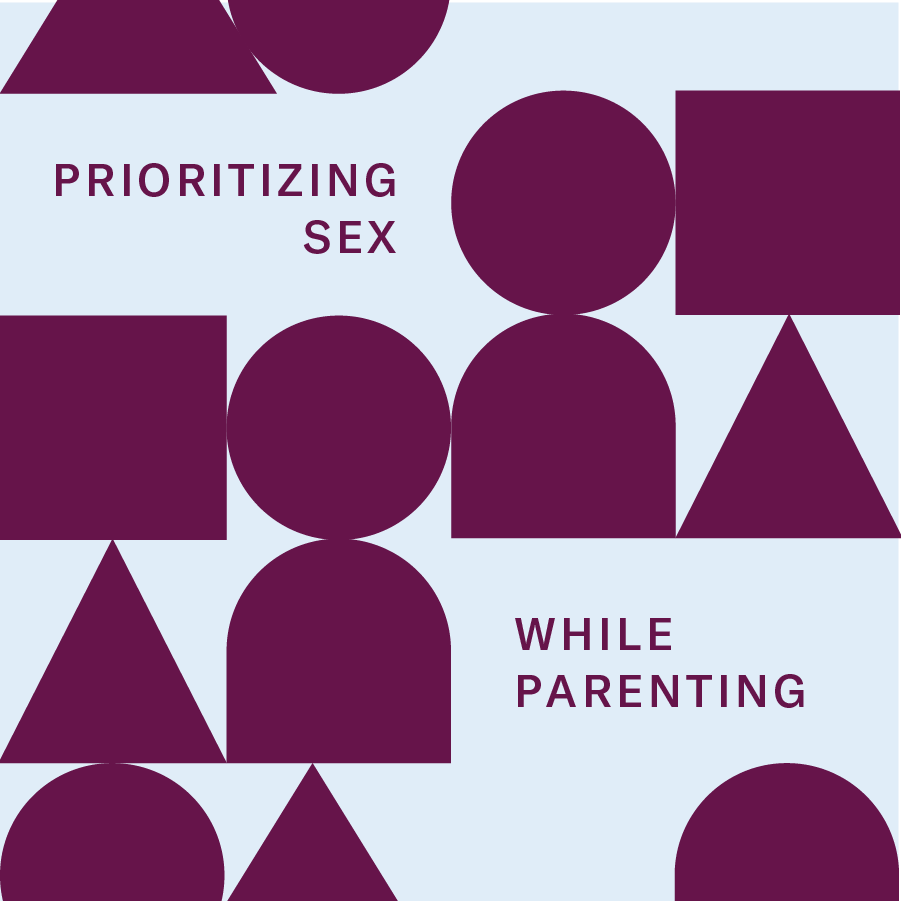For the first couple of months after giving birth, I wasn’t thinking about sex. Much of that was because I spent a chunk of time after each delivery unknowingly battling retained placenta. As one could imagine, postpartum complications are an excellent libido killer. But each time, I’d heal from my delivery and my D&C and fall face-first into the chronic exhaustion of nursing and newbornhood while acclimating to our new expanded family. Eventually, I’d feel comfortable enough in my body to begin the gradual process of being interested in sex, despite the onslaught of dirty diapers and breast-pump parts. As our family grew from one child to two, it became increasingly apparent that experiencing any intimacy would be challenging. Sure, there were new things to process about body image and healing. But the most significant challenges came from not having the desire for sex after a long day of working from home with continuous requests from the children. Now that they’re two and five years old, that adjustment continues. Some things are easier; other aspects, not so much. I’m not the only one who struggles to prioritize my sexual needs and boundaries as a parent. My access to models of healthy desire among parents, let alone Black families, has made that harder. There’s a ton of pop culture that depicts the frustration parents feel in their sex lives after having children. ( F*ck, a short indie film, portrays the struggle particularly well.) But there isn’t much conversation in real life, and there isn’t much data, either. “Your time allotment and dedication has taken a huge shift, and that’s completely normal,” says Megan Stubbs EdD, a Board-Certified Sexologist, who says one of the most significant shifts parents anticipate is a lack of time. But, she points out, it’s so much more than that. Many parents—especially those who mother—report feelings of stress and being “touched out,” which isn’t surprising considering all of the physical changes that accompany parenting. With these stressors “may come a decreased interest in sex,” Stubbs says. “Sure, you might have some ‘free time’ at the end of the day, but if there is no urge to have sex, that’s ok!”
Openly discussing changes in energy, desire, and free time is the best way to help parents make adjustments.
In 2018, Leesa, a mattress company that conducts research for social impact, led one of a limited number of surveys on how parenting impacts one’s sex life. Their results suggested nearly half of respondents felt that the quality of sex got worse. We need to ensure we have data showcasing parents’ diverse experiences across gender, orientation, class, and partnership status, among other things. But also, we don’t have to wait for that research to occur before normalizing sex while parenting. Stubbs believes openly discussing all the changes in energy, desire, and free time is the best way to help parents make adjustments that work for them. Thankfully, she also had a few suggestions for making the process easier.
If you’re struggling with time
In a perfect world, all sex would be hot, satisfying, and most importantly, spontaneous. But in a parenting world, scheduled sex might be the only sex you can fit into your day. Stubbs says parents shouldn’t think of scheduling sex as some lesser form of connection. “If you’re a busy parent, you should lean heavily into the scheduled sex,” she says. “That way, it sets the intention of the potential to have sex on Wednesdays and Sundays, for example. Again, depending on your schedule, spontaneous sex may just not be in the cards.” If you are struggling to get on board with this arrangement, try to reframe your thoughts: Instead of coding this adjustment as the end of fun sex, consider it proof that you and are your partner committed to prioritizing your relationship and physical intimacy. You don’t have to plan the details to the minute! Anticipation can be sexy.
Interruptions are teachable moments
If you’re a parent hoping to regain control of your sex life before your children move out, you gotta get used to interruptions. I get it—it sounds weird and awkward. My biggest fear is to overhear my preschooler telling his peers what he’s walked in on or found in our “special drawer” for show-and-tell. Unfortunately, we can’t stop stories from the sheets from showing up in the virtual streets. But Stubbs says parents can use interruptions as teachable moments that offer a chance to discuss boundaries with our kids, and there is nothing weird or awkward about that. “This is a great chance to talk about boundaries, privacy, and respect,” she says. For older kids, “talk to them about what a closed door means. Talk about knocking or empower them to get their own glass of water or something if that’s a frequent request.” And don’t worry: Younger kids won’t even remember.
“Getting in touch with yourself can help elevate those sexy feelings and remind you that you are still who you used to be."
“Honoring the sexuality of ourselves and our partners is crucial if we want to have a sex-positive household,” says Stubbs. As parents, we have to remember a lot of these early moments are much bigger than us. Having these hard chats and modeling what it looks like to prioritize intimacy in our relationships sets a solid foundation for our children. They might be oblivious now—or roll their eyes if they’re older—but we’re giving them tools to avoid much of the stigma we’ve had to process.
Mutual, manual, or rest: It’s all alright
Stubbs says it’s totally reasonable if your sex drive is in a constant state of flux, especially as a new parent. Your desire will return when it’s ready. “Remember that you are still who you used to be,” she says. “Touching yourself and receiving pleasure are great ways to remind yourself that even though this new role of parenthood is making a new normal for you, that doesn’t mean that everything has to go out of the window.” There’s a source of action for every scenario. If you're not ready for penetration: Mutual masturbation is a great way to experience the benefits of sex with none of the discomforts, if delivery occurred recently. If your desire is there, but your self-confidence is lagging: Feel free to spend time exploring yourself before you allow a partner to do so. Has anything about your body changed in the weeks (or years) since delivery? Appreciate your body for what it has done and continues to do for you. If you’re just not feeling it: Stubbs encourages parents to remember that a lack of interest in sex is normal, especially for parents who struggle to feel sexy due to overstimulation of all-day caretaking. Instead of sex, consider seeking opportunities for self-care and time alone. “Getting in touch with yourself can help elevate those sexy feelings and remind you that you are still who you used to be,” says Stubbs. “Give yourself permission to go slow and figure it out day by day. Consider activities that will make you still feel connected with your partner that




















































